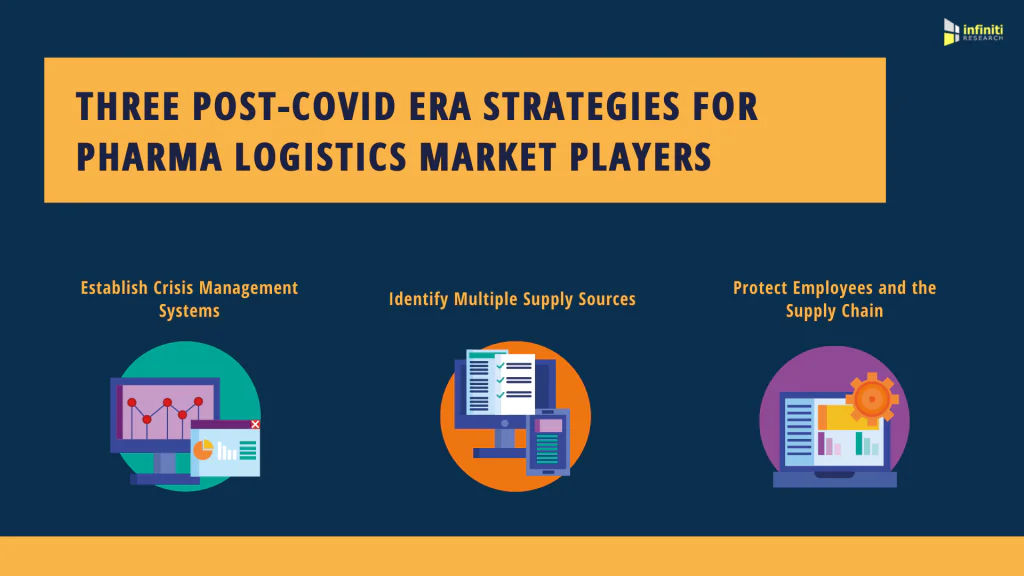The pharmaceutical industry is potentially the most challenging industry, with regard to supply chain complexities, regulations, competition, and logistics functions. Pharma logistics is an industry sector dedicated to acquiring, warehousing, and transporting pharmaceutical drugs, equipment, and devices. It is a challenging and tumultuous market, and requires a significant investment, strategizing, and data-driven decision-making.
Pharma logistics challenges include the risks of contamination, the need for temperature-controlled environments, regulatory changes, and ensuring no disruption of public health. Pharma companies have attempted to streamline their supply chain and logistics operations; however, these pharma logistics challenges continue to plague industry players.
The COVID-19 pandemic has caused various pharmaceutical industry challenges, including significant supply chain disruption, further regulation changes, added risks, and creating obstacles for important business operations, such as mergers and acquisitions. As companies attempt to overcome the various pharma logistics challenges introduced by the pandemic, it is equally crucial to establish sustainable strategies for the upcoming post-COVID era.
These strategies should aim to negate the pandemic’s impact and ensure that business continuity is secured in the case of other crises. Additionally, strategic business decisions will help pharmaceutical companies stay a step ahead of their competitors, enter the post-COVID era with robust business plans, and launch themselves into a period of growth. Therefore, in this article, Infiniti’s market research experts discuss the pharma logistics challenges caused by the COVID-19 pandemic and provide insights into our solutions and the ideal strategies for all market players.
The COVID-19 pandemic has had a jarring impact on the world and caused various pharma logistics challenges. To overcome these challenges and prepare for the post-COVID era with our market research solutions, request a free proposal.
Impact of COVID-19 on Pharma Logistics
The COVID-19 pandemic has taken a substantial toll on normalcy across industries, demographics, countries, and lives. Causing severe amounts of economic, political, and social unrest, the pandemic has inflicted further pressure on struggling pharmaceutical and healthcare industry players. The need to innovate is a constant pressure in the pharmaceutical industry, and the demand for an effective vaccine has enforced and increased this pressure substantially. Additionally, due to the impact on personal lives, employees, and professionals, most industries and companies have had to pause, stop, or restructure supply chains.
In the pharmaceutical industry, this change has included changes to the pharma logistics sector and increased the need for improved strategies and streamlined operations. Transportation has been paused in many countries, raw materials are challenging to acquire, companies have suffered losses, and these challenges have left the pharma industry at a major disadvantage.
However, as governments, researchers, and companies discover and develop the ideal vaccine to the COVID-19 virus, industry players can develop strategies to tackle pharma logistics challenges. Comprehensive and sustainable strategies can help negate the impact of the pandemic and ensure an overall improved supply chain across the industry.
Overcoming the business implications of COVID-19 can be highly challenging. Request more information and learn how your company can identify, evaluate, and address all pharma logistics challenges caused by the pandemic with our solutions.
Strategies for Pharma Logistics in the Post-COVID Era
Infiniti’s market research experts have analyzed the impact of the COVID-19 pandemic on the pharma logistics sector and studied industry players’ pain points. With their observations, they have identified three significant challenges and their ideal solutions in this article. These strategies aim to help pharmaceutical industry players tackle the major pharma logistics challenges and ensure smooth operations in the post-COVID era.

Strategy 1: Identify Multiple Supply Sources
Most pharmaceutical companies witnessed their operations come to a screeching halt as the pandemic impacted China and India. Being the most prominent countries sourcing crucial active pharmaceutical ingredients (APIs), the global pharmaceutical industry was set-back substantially by the sudden unavailability of imperative raw materials. Although the US and Europe manufacture APIs, China and India hold a much larger market share, and India is known to be the largest manufacturer of generic drugs.
This overdependency on one particular vendor, source, or country led to huge losses and disruptions in the pharmaceutical industry. Therefore, Infiniti’s market research experts highlight the importance of identifying and enlisting other suppliers and vendors for the sake of emergencies or general raw material procurement. With our market trackers, pharmaceutical companies can keep track of vendors, suppliers, products, and services from around the world. This allows companies to find stand-by vendors and gain comprehensive guidance from our experts regarding identifying and establishing the ideal partnerships in the pharmaceutical industry. Additionally, market trackers can help companies overcome pharma logistics challenges regarding raw material sources with constant global updates and data.
Strategy 2: Establish Crisis Management Systems
The pandemic spread fast and caused a global panic. Governments closed down their countries, companies had to stop operations, and individuals had to quarantine. The economic impact of these decisions was vast and unfettered due to the lack of pre-emptive measures. Understandably, preparing for a pandemic is neither expected nor easy to plan. However, market risk, natural disasters, and economic uncertainty are impending and potential challenges that industries and governments face.
Establishing efficient, data-driven, and comprehensive crisis management strategies can be the differentiator between industry leaders and companies experience losses. Infiniti’s risk assessment solutions help businesses identify potential risks in their markets, establish effective risk or crisis management systems, and mitigate risks substantially. With our risk assessment solutions, pharmaceutical companies can identify potential risks, reduce significant problems, and stay prepared for future pharma logistics challenges.
Strategy 3: Protect Employees and the Supply Chain
Social distancing, renewed hygiene protocols, regulations regarding personal protective equipment, and strict enforcement of these protocols have become standardized across countries. This has led to various pharma logistics challenges, including the inability to continue previous operations without risking employee safety and the possibility of contaminated drugs, devices, and equipment being transported. Additionally, pharma industry players must comply with more challenging regulations and hygiene protocols to maintain business continuity and avoid customer churn.
To ensure employee safety and minimize potential contamination through the supply chain, pharmaceutical companies can adopt industry best practices and efficiently comply with government policies. Infiniti’s industry best practices assessment enables pharmaceutical companies to benchmark and analyze best practices used by industry leaders or key competitors and utilize them to ensure employee and supply chain safety from the virus, contamination, and other challenges.
Infiniti’s market research solutions can help your business enter the post-COVID era with robust and sustainable strategies. Speak with our experts and learn how our solutions have assisted pharmaceutical industry players through the pandemic.


